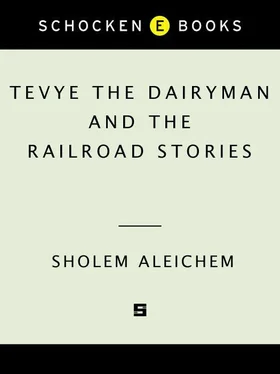45 Ka’asher ovadeti ovadeti —“If I perish, I perish.” Esther, 4:16.
46 Loy dubim veloy ya’ar —Literally, “neither bears nor woods”; a rabbinic expression (based on the story of the prophet Elisha and the bears in Kings II, 24) that means, “There’s neither hide nor hair of it,” “It’s a figment of the imagination,” etc.
47 Lekhayim veloy lamoves—“For life and not for death , for a blessing and not for a curse.” From the prayers for dew and rain.
48 Altis’haleyl beyoym mokhor—“Boast not of tomorrow , for thou knowest not what today may bring forth.” Proverbs, 27:1.
49 Vetso’akoh hane’aroh —“For he found her in the field [and abused her] and the maiden cried , and there was no one to save her.” Deuteronomy, 22:27.
50 “The Lord giveth and the Lord taketh away”—Job, 1:21. 341 Li hakesef veli hazohov—“The silver is mine and the gold is mine , saith the Lord of Hosts.” Haggai, 2:18.
51 Be’al korkhekho atoh khai —“Regardless of thy will thou art conceived, and regardless of thy will thou art born, and regardless of thy will thou livest , and regardless of thy will thou diest.” From The Ethics of the Fathers; a favorite quote of Tevye’s.
52 Koyl ha’odom koyzev —“I said in my haste, all men are liars.” Psalms, 116:11. Apparently Tevye is referring to the bill of goods that Menachem Mendl has sold him — unless he is confusing the verb koyzev , “lie,” with koy’ev , “hurt.”
53 Bonim gidalti veroymamti—“I have nourished and brought up children , and they have rebelled against me.” Isaiah, 1:2.
54 Loy mi’uktsokh veloy miduvshokh —“Neither from your sting nor from your honey”; a rabbinic expression meaning, “Just do me no harm and I’ll gladly do without your favors.”
55 Askakurdo dimaskanto dikarnaso difarsmakhto —This is a sheer nonsense phrase, although one whose Aramaic prefixes and suffixes give it a Talmudic sound.
56 Odom koroyv le’atsmoy —“A man is closest to his own self”; a rabbinic saying.
57 Im eyn kemakh eyn Toyroh —“If there is no flour, there is no Torah”; from The Ethics of the Fathers , meaning that before one can study, one has to eat.
58 Rashi Here again Tevye is putting his own words in the commentator’s mouth.
59 Rokheyl mevakoh al boneho —“A voice is heard in Ramah, lamentation and bitter weeping; Rachel weeping for her children , refusing to be comforted for her children, for they are gone.” Jeremiah, 31:15.
60 Gemara — The larger and more difficult part of the Talmud, consisting of lengthy and involved Aramaic commentary on the shorter and simpler Hebrew Mishnah.
61 Haggadah
62 Haneshomoh lokh—“The soul is thine and the body is thine.” From the penitential prayers said before the High Holy Days. For the sake of the witticism, Tevye overlooks the second half of the verse.
63 Tsoholoh vesomeykhoh —“And the city of Shushan rejoiced and was glad.” Esther, 8:15.
64 The hallel prayer — A prayer of praise and thanksgiving to God, composed of Psalms 113–118, that is recited in the morning service on major holidays. All Tevye’s quotations on this and the following page are from it.
65 Hashomayim shomayim ladoynai —“The heavens are the Lord’s.” Psalms, 115:16.
66 Veha’orets nosan livney odom —“But the earth He hath given to the children of men.” Psalms, 115:16.
67 Loy hameysim yehallelu yoh —“The dead praise not the Lord.” Psalms, 115:17.
68 Ve’anakhnu nevoreykh yoh —“But we will bless the Lord.” Psalms, 115:18.
69 Ohavti ki yishma—“I love [the Lord], because He hath heard my voice and my supplications.” Psalms, 116:1.
70 Ofafuni khevley moves—“The sorrows of death compassed me , and the pains of hell got hold upon me: I found trouble and sorrow.” Psalms, 116:3.
71 Ani omarti bekhofzi
72 Koyl ha’odom koyzev —“… all men are liars.” Psalms, 116:11.
73 Oydkho ki anisoni—“I will praise Thee, for Thou hast answered me and art become my salvation.” Psalms, 118:21.
74 Hakoyl hevel
75 The Four Questions — At the beginning of the Passover seder the youngest child present customarily asks four questions about the nature of the occasion that are designed to elicit from those present the recital of the story of the exodus. The Four Questions begin with the words ma nishtanoh —“how is this [night] different?”
76 Solakhti kidvorekho —“And the Lord said, I have pardoned according to thy word.” Numbers, 14:20.
77 Vehashtiyoh kedos —“And the king made a feast … and the drinking was according to custom” Esther, 1:5,8.
78 Borukh shelo osoni ishoh —“Blessed be [God] that hath not made me a woman”; a blessing in the morning prayer, recited by males.
79 Bonim gidalti veroymamti
80 Veheym poshu vi —“And they have rebelled against me.” See note to this page on bonim gidalti veroymamti . Here Tevye supplies the second half of the verse that he omitted at the beginning of the story.
81 Odomyesoydoy mi’ofor vesoyfoy le’ofor . Tevye completes the quote here by adding the words vesoyfoy le’ofor —“and dust is all that remains of him.”
82 Kabdeyhu vekhoshdeyhu —A rabbinic adage meaning literally, “Respect him and suspect him,” i.e., some people must never be trusted even though you honor them.
83 Haneshomoh lokh vehaguf shelokh .
84 Kitoyvas mar’eh hi —“For she was fair to look on.” Esther, 1:11.
85 Kulonu khakhomim, kulonu nevoynim —“And even though we allarewue, we all are learned , we all are versed in the Torah, we are commanded to recite the story of the exodus from Egypt.” From the Passover Haggadah.
86 Al tishlakh yodkho —“And he said, lay not thine hand upon the lad.” Genesis, 22:12 (see Introduction, this page).
87 Vesomakhto bekhagekho —“Thou shalt observe the Feast of Tabernacles seven days … and thou shalt rejoice in thy feast.” Deuteronomy, 16:13–14.
88 Vayehi hayoym .
89 “Help the jackass of your neighbor”—“If thou see the ass of him that hateth thee lying under his burden … thou shalt surely help him.” Exodus, 23:5.
90 Vaya’as eloyhim—“And God made … every thing that creepeth on the earth.” Genesis, 1:25.
91 Kulom ahuvim, kulom brurim .
92 Bekhoyl levovkho uvekhoyl nafshekho —“And thou shalt love the Lord thy God with all thine heart, and with all thy soul , and with all thy might.” Deuteronomy, 6:5.
93 Vehayeled eynenu —See note this page.
94 Vayehi erev vayehi voyker —“And there was morning and there was evening.” Genesis, 1:5 and passim.
95 Revakh vehatsoloh ya’amoyd layehudim mimokoym akher —See note to this page. Here Tevye completes the verse by adding mimokoym akher , “from another place.”
96 Akudim nekudim uvrudim .
97 Yo’oh aniyuso leyisro’eyl —“Poverty is becoming to Israel.” The Talmudic adage implies that God gave the Jews poverty as a gift because it is spiritually good for them, but Tevye reverses its meaning.
98 Im eyn kemakh eyn Toyroh .
99 Loy bashomayim veloy ba’orets —“Not in heaven or on earth.” While the phrase bashomayim uva’orets , “in heaven and on earth,” occurs in the Bible and other Jewish sources, its formulation in the negative is Tevye’s own.
Читать дальше












